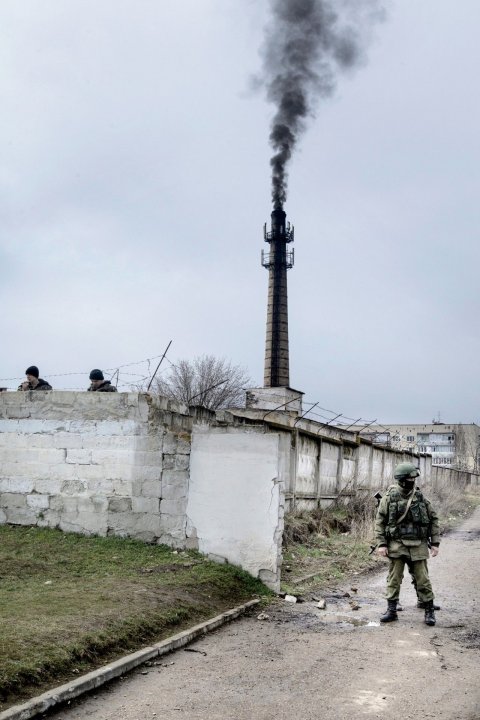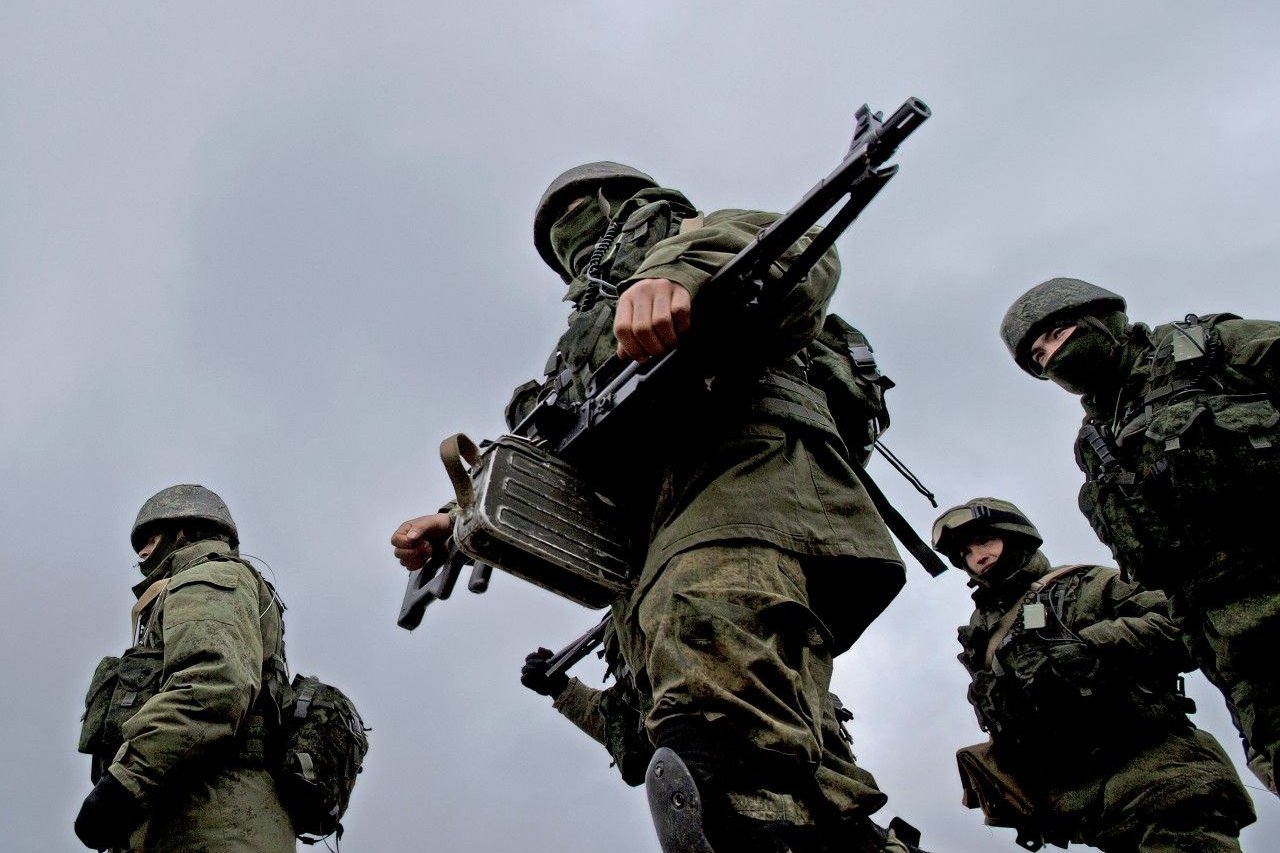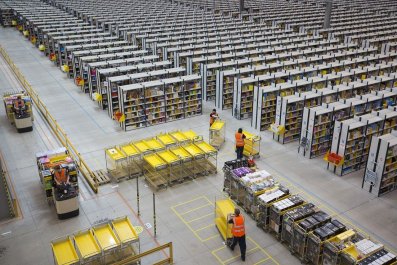Vladimir Putin loves to talk nostalgically about the might of the former Soviet Union—and in annexing Crimea, he has taken a dramatic step toward re-creating it. But Russia's strongman hasn't read his history: In truth, the might of the Brezhnev-era USSR was built on high oil and gas prices. When those prices began to fall in the 1980s—with more than a little help from Ronald Reagan's White House—Soviet power crumbled with it. Now, a generation later, Western politicians are remembering that energy can be used as a geopolitical weapon. Putin, it seems, is not the only leader who can play the game of History Repeating.
"Putin looks strong now, but his Kremlin is built on the one thing in Russia he doesn't control: the price of oil," says Ben Judah, author of Fragile Empire, a study of Putin's Russia. "Eventually, the money is going to run out, and then he will find himself in the same position Soviet leaders were in by the late 1980s, forced to confront political and economic crises while trying to hold the country together."
Energy is a potent weapon for the West in the new Cold War against Vladimir Putin—just as it was the last time around. President Barack Obama has already made the first move, announcing last week that he would speed up plans to export liquefied natural gas, or LNG, to Asian and European markets. He's also removed 1970s restrictions on exporting U.S. crude oil, goaded by accusations by Republican Speaker of the House John Boehner that the White House's prevarication on oil and gas export licenses was helping Putin "to finance his geopolitical goals." And he's sold off 5 million barrels of the U.S.'s 727-million-barrel-strong strategic reserve, depressing prices, as a "test release."
(Putin too has played the energy card: On April 1, Russian state-controlled gas giant Gazprom announced a more than 40 percent price hike for natural gas to Ukraine.)
{C}{C}{C}
Obama didn't come to the White House as a Big-Oil-friendly president. But luckily for him, the world's macro cycles of energy supply and demand are on his side. Over the past six years, shale gas and hydraulic fracturing of hard-to-reach crude oil have delivered a wholly unforeseen era of cheap energy in the U.S., sending domestic crude production soaring by 60 percent and natural gas prices tumbling to a third of 2008 levels. By 2016, the U.S. will be producing more oil than Saudi Arabia; by 2020, it will be energy self-sufficient.
And more oil is coming onto market in the rest of the world, too. This year, Iraq's West Qurna-2 field (ironically enough, part-owned by Russia's Lukoil) will start pumping up to 4 million barrels per day. Iran is due to export its first crude oil since the first round of international sanctions easing after a tentative deal last year on the country's nuclear program.
Energy hawks like George Soros have urged Saudi Arabia to pitch in, too. After all, it was the Saudis, with their huge excess production capacity, who really crashed the price of oil to punish the Soviets for their invasion of Afghanistan in 1979. And though the world's energy landscape has changed radically, the Saudis remain the world's lowest-cost producer, still able to hold their nose and dunk everyone else underwater by pumping more than 3 million extra barrels a day, sending prices plummeting.
This time around, though, it's less likely that Riyadh will come to Washington's aid. For one, the Saudis are angry at the U.S. for its rapprochement with Iran, and for not doing more to support the largely Sunni rebellion against the regime in Syria. And the Saudis stand to lose just as much as the Russians from low prices—Riyadh's own budget now balances with crude at around $85, according to Bloomberg.
The Saudis are certainly angry with Putin because of his support of Syria's Bashar al-Assad. Last August, at a secret meeting outside Moscow, Saudi Prince Bandar bin Sultan, head of Saudi intelligence, offered Putin a deal to give the Russians a free hand with oil in the Eastern Mediterranean, rein in Chechen extremists who might disrupt the Sochi Olympics, and even guarantee a Russian naval base in Syria—all in exchange for a withdrawal of Russian support for Assad.
"The Chechen groups that threaten the security of the games are controlled by us," Prince Bin Sultan allegedly said, according to transcripts published by the Russian and Lebanese press. "We understand Russia's great interest in the oil and gas in the Mediterranean from Israel to Cyprus. And we understand the importance of the Russian gas pipeline to Europe. We are not interested in competing with that. We can cooperate in this area."
Putin clearly chose not to take the deal and continued with his foursquare support for the Damascus regime: On Christmas Day 2013, Russia signed a 25-year deal with Assad handing the state-controlled energy firm Soyuzneftegaz a chunk of the Eastern Mediterranean's Levant Basin. But for the moment, at least, the evidence is that the Saudis would prefer to talk to the Russians over torpedoing their economy—along with their own.
Barring a sudden, serendipitous Saudi production hike, the single biggest challenge for Western energy hawks is how to wean Europe off Russian gas. Russia twice shut down supplies to Ukraine—and to European customers who received gas via Ukraine—in 2006 and 2009. Scared by the unreliability of Gazprom, Europeans began to seek out alternative sources. As a result, from 2006 to 2013 the share of Russian gas in Europe's overall consumption fell from 39 to 25 percent. But at the same time Gazprom and its subsidiaries were busy buying up European infrastructure—Germany's largest gas storage facility, for instance—and doing deals to build more. Over the past decade, Italy, Hungary, Bulgaria, Serbia and Greece have signed up (with varying degrees of commitment) for the Gazprom-inspired South Stream pipeline designed to bring Russian gas to the Balkans, while EU-backed plans for an alternative pipeline to Azerbaijan and Central Asia, called Nabucco, have been repeatedly trounced by Gazprom money and determined Russian diplomacy.

But this time may be different. Russia's annexation of Crimea was a "very strong wake-up call for Europe" about energy issues, José Manuel Barroso, president of the European Commission, said at an EU-U.S. summit in Brussels in late March. "Europe is working very decisively to reduce its energy dependency." In practical terms, that means boosting fracking and nuclear energy—both despised by politically powerful European Greens.
According to figures from the U.S. Energy Information Administration, Europe is sitting on roughly 470 trillion cubic feet of recoverable shale gas resources—roughly 26 years' supply for the whole continent. But only Poland and the U.K. are actually drilling shale gas wells. Polish Foreign Minister Radosław Sikorski optimistically hailed his country as "a second Norway" within a decade, thanks to fracking—even though Exxon Mobil, Talisman and Marathon Oil all gave up on their search for Polish shale gas in 2013. But enthusiasts like Sikorski are in a minority: Germany, Denmark, Ireland and the Netherlands have informal fracking bans, while in Bulgaria and France the practice is banned outright.
"It will take a while before France and Germany change their policies toward shale," says Will Pearson, director of global energy and natural resources at Eurasia Group. He predicts that eventually "hostility toward the sector is going to dissipate" as Europe tries to decrease its dependence on Russian energy. But it won't be a quick process.
Boosting nuclear energy is another obvious alternative. But hopes that Europeans had gotten over the specter of Chernobyl were dashed by the March 2011 meltdown at the Fukushima Daiichi nuclear complex in Japan. German Chancellor Angela Merkel, under pressure from the Green Party in the Bundestag, decided to shut down all of Germany's nuclear plants by 2022. Her plans for Germany's energiewende—literally, energy turnaround—would make up the 15 percent of demand currently supplied by nuclear energy with renewables, and few German politicians have dared to speak out against the powerful Green lobby.
{C}{C}{C}
Politically and practically, the easiest way to break Gazprom's hold on Europe would be to boost LNG facilities. "The only way to limit the monopoly supplier's ability to exact damage and sow discord through the deployment of the price weapon is to establish alternative supply routes," Hungary's ambassador-at-large for energy security, Anita Orban, told the U.S. Congress last week. LNG could be good business too, because Europeans currently pay close to $300 per thousand cubic meters of gas, about three times the spot price in the U.S. But Geoffroy Hureau, secretary-general of CEDIGAZ, the gas industry's leading data source, says, "I'm not sure it's a realistic option" to look for American gas exports as a quick fix. "Most of the U.S. LNG would prefer to go to Asia," he says. "The prices are higher."
In any case, the first of six newly licensed U.S. LNG export facilities—in Louisiana—won't open before 2015. Europe already has 22 such terminals—used mostly to import gas from Algeria, Egypt and Qatar—with Poland, Lithuania and Estonia building new ones.
Russia's response to threats of shrinking demand from Europe has been to shrug and threaten to turn to China instead. Gazprom has been negotiating a major 30-year supply deal with Beijing for 15 years now—and analysts say it could finally be sealed when, as widely expected, Putin visits Beijing next month.
A deal between the two vast, contiguous countries should be a no-brainer. Russia produces huge amounts of oil and gas, both of which China consumes ravenously—and will continue to for decades. But expectations for a deal have been dashed repeatedly. For decades the two countries haven't trusted each other. (China's enormous population and rapid economic growth—set against the vast, underpopulated emptiness of Russia's far east—makes Moscow very nervous.)
Still, Chinese President Xi Jinping, who took office last year, and Putin have worked to establish better relations—and a gas deal will test how far they've come. China has objected to the pricing terms Gazprom has sought for its gas and has worked assiduously to create options with other central Asian producers.
Now, the tumult in Ukraine—and the West's reaction to it—puts more pressure on Moscow to accept China's terms in order to create a significant market in the east. The Ukrainian crisis has tipped the balance of power east in the dance between Moscow and Beijing over gas pricing, says Hureau. Roughly 55 percent of Gazprom's overall revenue from gas sales now comes from Europe, and "they want to diversify that." Asked if Russia will finally sign a gas deal on terms closer to those China seeks, a senior commodities banker with ties to both sides answers, "Yes and yes."
Some analysts question whether Gazprom even has the capacity to deliver on the deal. Gazprom's dirty secret is that pretty much all of Russia's domestic gas production is used domestically, in Russia's massively inefficient industries and cities. It buys the surplus it exports to Europe from Kazakhstan, Uzbekistan and Turkmenistan at knockdown prices. But two years ago, Beijing bypassed Gazprom and opened a 6,400-kilometer gas pipeline from Turkmenistan to China at a cost of $6.5 billion (or about $1 million per kilometer; by comparison, Gazprom's Bovanenkovo-Ukhta pipeline cost about $18 million per kilometer). Chinese competition is pushing up prices at source and cutting into Gazprom's margins. Although the exact figure is a commercial secret, China probably pays Turkmenistan between $100 and $140 per thousand cubic meters of gas.
And China has been attempting a shale gas revolution of its own, though there are significant geological challenges, not least because fracking is a water-intensive process and the shale-rich parts of China lack water. Still, according to optimistic forecasts, China could extract up to 6.5 billion cubic meters of shale gas a year by 2015 and up to 60 billion to 100 billion cubic meters by 2020. In other words, between Turkmenistan and its own shale deposits, China already has access to plenty of inexpensive gas—another reason that it has dawdled on signing the Gazprom deal.
Whether Putin signs the China deal or not, the bottom line is that despite years of talk from the Kremlin about the importance of diversifying Russia's economy, it remains utterly dependent on oil prices. Last year oil and gas revenues accounted for 70 percent of Russia's total exports and more than half of government income. Russia exports more than 7 million barrels of crude a day, second only to the Saudis. Some of those oil profits have been parked in a reserve fund, but most have been spent by Putin on such extravagances as the $53 billion Sochi Winter Olympics and a recent 20 percent pay rise for Russia's bloated tribe of state officials.
That spending binge means that Russia's budget now balances at an oil price of $117 a barrel—compared with the $45 a barrel break-even point in 2008. And instead of rising inexorably as they have done for most of Putin's 14-year Kremlin career, world oil prices are now heading steadily downward. A combination of flattening consumption and rising production means that "the $90-a-barrel floor on the world oil price over the past few years will become a $90 ceiling," according to Edward Morse, Citigroup's head of global commodity research.
In the short term, Western moves to reduce dependence on Russia and to depress oil prices are not "on a scale that is clearly damaging for Russia yet," says Andrew Monaghan of the NATO Defense College in Rome. "Russian financial reserves provide something of a cushion." Yet as Mikhail Gorbachev found—to his considerable cost—there is nothing deadlier to a leader's power and popularity than a steadily sinking economy, which for both him and Putin means sinking oil prices. The West's energy war may not be the kind of quick, flashy land grab favored by Putin. But it's a tried and tested empire killer.






















